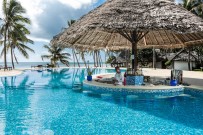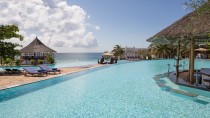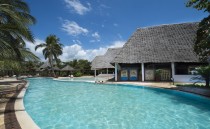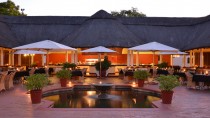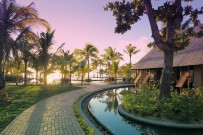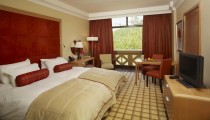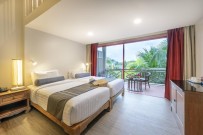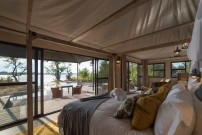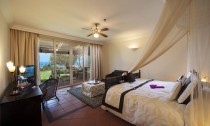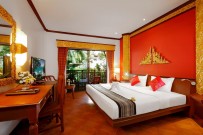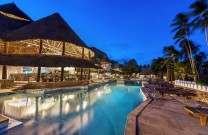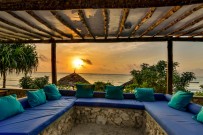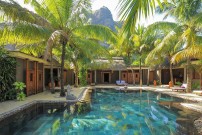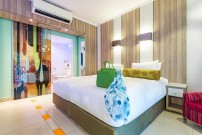Search results for 'Visit Cheapfifa23coins.com 30% OFF code:FIFA2023| it is a very good and fast team, I hope they reach as high as possible for fi'
Maximum words count is 10. In your search query was cut next part: and fast team, I hope they reach as high possible for fi.
-
Home away from Home
Karafuu Beach Resort & SPA...
ZAR2,500.00
ZAR2,357.00
WELCOME TO ZANZIBAR
Jambo! This is the Swahili greeting that you will hear on arrival when you are welcomed by the warm and inviting locals. Zanzibar is the name of an archipelago in the Indian Ocean just off the coast of East Africa. There are many small islands and two large ones: Unguja (the main island, sometimes informally referred to as 'Zanzibar'), and Pemba Island. As the number one beach location in East Africa, Zanzibar is a wonderful island, with classic tropical beaches, lush plantations, an incredible history and a fascinating culture. Apart from historic Stone Town, with its labyrinth of narrow streets, Zanzibar is known for its beautiful palm-fringed beaches and pristine coral reefs.
HISTORY
Zanzibar was inhabited by Portuguese navigators at the end of the 15th century. They were ousted 200 years later by the Omani Arabs and Zanzibar became a major centre for slave trading. The island became an Arab state and was an important centre of trade and politics in the region. European explorers, including Stanley and Livingstone, began their expeditions into the interior of Africa from Zanzibar in the late 1800’s. In 1964, the sultan and the government were overthrown in a revolution and in the same year, Zanzibar and Tanganyika combined to form the United Republic of Tanzania.
LANGUAGE
The indigenous language spoken throughout Zanzibar is Swahili (called Kiswahili locally). English is widely spoken and understood. Jambo Rafiki – Hello my friend!
CULTURE
Most of the people in Zanzibar are Muslim and all towns and villages on Zanzibar Island have mosques. Visitors to Zanzibar Town (Stone Town) will hear the evocative sound of the muezzins calling people to prayer from the minarets, especially for the evening session at sunset. There are also small populations of Christians and Hindus.
CLIMATE
Zanzibar is a few degrees south of the equator and enjoys a very tropical climate. The average daytime high is between 28°C and 32°C and the night-time lows are between 20°C and 25°C. Temperature wise – this island is an all-year-round winner. February is very hot and very humid (just leave your hair straightener at home!) and March to May are the wettest months.
CURRENCY
The local currency is Tanzania Shillings (TSH) but the currency cannot be bought outside of the country. Cash (US Dollars) and credit cards are accepted at hotels and at any Bureau de Change. We strongly recommend that you take USD cash in small denominations for incidental purchases, tips etc.
ELECTRICITY
220/230 V. square pin adapter (same plugs as UK). It is advisable to take along an international adaptor.
MALARIA
As Zanzibar is situated in a malaria zone, it is recommended that you consult your physician on the correct preventative medication required before you travel.
WHAT TO DO IN ZANZIBAR
Whether you spend your days lazing by the pool, sipping cocktails on the beach at sunset, diving in warm waters or enjoying a Dhow cruise around small islands, your Zanzibar holiday will be a memorable experience.
- Diving: With living reefs surrounding the islands, Zanzibar has excellent dive locations. There are plenty of places where the water temperature is warm, visibility is usually excellent, and currents are weak, all of which contributes to an ideal location for first time and novice divers. In addition to the warm and still waters full of colourful fish, there are many challenging dives as well. If you want to surf the current through a ravine, go for deep water, or search for wrecks, there are dive companies that can make it happen for you. Many of the larger resorts on the north and east coasts have professionally-run dive shops as well. Qualified divers must produce certification and a log book.
- Shopping: Whether you’re in the market for T-shirts, spices, kangas, furniture or hand sewn pillow covers, Stone Town is a great place for fun shopping and bargain hunting. You will find the inevitable ashtray carved out of a coconut shell, but there are enough Tinga-tinga paintings, woodcarvings and woven goods to keep almost everyone in the market for a tasteful souvenir.
- Stone Town: Declared a UNESCO World Heritage Site in 2001, Stone Town is a mishmash of cultures, languages and architecture. Over the centuries, Stone Town has grown from a small fishing village to a thriving town with an extraordinary history. Walking around Stone Town, you can see the influence of the different cultures that make up Zanzibar. Coral and stone houses show offimposing Zanzibar doors with brass studs as a defence against charging elephants and carvings with scriptures from the Quran. A tour of the town is highly recommended.
- Excursions: There are loads of excursions available to help you explore this unique island. It is wise to stick to a reputable operator and not be lured by beach boys and vendors who prey on tourists promising cheap prices. There are two excursions that are not to be missed in our opinion. A visit to a spice farm village on the Spice Tour will allow you to walk through the farm with your guide – touching, smelling and tasting different spices and fruits. It will give you an insight into local life and the opportunity to try some Swahili dishes, taste the fruits in season and try some spiced tea.
Setting sail on a traditional dhow will be one of the highlights of your trip. Safari Blue is a full day excursion which takes you out into Menai Bay – a haven of beautiful uninhabited islands where the waters are frequented by humpback and bottlenose dolphins. The anchor is dropped on a sandbank which makes for some spectacular snorkelling. Drinks are served throughout the day and lunch is a buffet of grilled fish, lobster, calamari and chicken. Make sure this one is on your itinerary.
WHAT TO PACK
- As a guide, the maximum weight for checked luggage is 20kg in economy class.
- Your hand-luggage should not weigh more than 6kg and needs to be small and compact
- Take along your best beach and casual wear, perfect for the day
- The dress-code for dinner is usually smart casual and gents may be required to wear long trousers
- Take an umbrella or rain poncho if travelling from October to January to March to June
- When in town, men & women should have their shoulders and knees covered. Bermuda shorts and a polo shirt are perfectly fine but halter-tops and miniskirts are insulting to locals
- Sunglasses and suntan lotion are a must
- Don’t forget any medication that you might need, and be sure to pack it in your hand luggage
- Chargers for all your devices (it’s a good idea to take along a few movies on a tablet or something similar as the English TV channels in your hotel may be limited)
- Swimming shoes and goggles
- Mosquito repellent
- A sun hat or cap
TRAVEL TIPS
- Pack a change of clothing in your hand luggage in case of baggage delays (and a spare cozzie so at least you can have a swim when you get to your resort)
- Clothing creases less if rolled in a sausage shape when packed – so roll, don’t fold
- No sharp objects are permitted in your hand luggage (yes, tweezers are sharp!)
- Travel insurance is a must. If you can’t afford it, you can’t afford to travel!
- Travelling with kids – please check that you have all the relevant documents including unabridged Birth Certificates.
- Put electronics, medication, toothbrushes and jewellery in your carry-on bag
- It’s often a good idea to let your bank or credit card company know that you’re going overseas
- Be patient, be flexible, be spontaneous and have the best time ever!
DID YOU KNOW:
- Due to its proximity to the Equator, Zanzibar is warm throughout the year and has equal days and nights (12-hours each)
- The shortest war ever recorded by man is the Anglo-Zanzibar War where the British bombarded the Beit al Hukum Palace and after 38 minutes, a ceasefire was called.
- Zanzibar is popularly known as the Spice Islands.
- Zanzibar has the largest number of carved doors in Africa
- Freddie Mercury, lead singer of the band Queen, was born in Zanzibar in 1946. His birth name was actually Farouk Bulsara.
Learn MoreHome Away From Home
The Royal Zanzibar Beach Resor...
ZAR4,500.00
ZAR4,340.00
WELCOME TO ZANZIBAR
Jambo! This is the Swahili greeting that you will hear on arrival when you are welcomed by the warm and inviting locals. Zanzibar is the name of an archipelago in the Indian Ocean just off the coast of East Africa. There are many small islands and two large ones: Unguja (the main island, sometimes informally referred to as 'Zanzibar'), and Pemba Island. As the number one beach location in East Africa, Zanzibar is a wonderful island, with classic tropical beaches, lush plantations, an incredible history and a fascinating culture. Apart from historic Stone Town, with its labyrinth of narrow streets, Zanzibar is known for its beautiful palm-fringed beaches and pristine coral reefs.
HISTORY
Zanzibar was inhabited by Portuguese navigators at the end of the 15th century. They were ousted 200 years later by the Omani Arabs and Zanzibar became a major centre for slave trading. The island became an Arab state and was an important centre of trade and politics in the region. European explorers, including Stanley and Livingstone, began their expeditions into the interior of Africa from Zanzibar in the late 1800’s. In 1964, the sultan and the government were overthrown in a revolution and in the same year, Zanzibar and Tanganyika combined to form the United Republic of Tanzania.
LANGUAGE
The indigenous language spoken throughout Zanzibar is Swahili (called Kiswahili locally). English is widely spoken and understood. Jambo Rafiki – Hello my friend!
CULTURE
Most of the people in Zanzibar are Muslim and all towns and villages on Zanzibar Island have mosques. Visitors to Zanzibar Town (Stone Town) will hear the evocative sound of the muezzins calling people to prayer from the minarets, especially for the evening session at sunset. There are also small populations of Christians and Hindus.
CLIMATE
Zanzibar is a few degrees south of the equator and enjoys a very tropical climate. The average daytime high is between 28°C and 32°C and the night-time lows are between 20°C and 25°C. Temperature wise – this island is an all-year-round winner. February is very hot and very humid (just leave your hair straightener at home!) and March to May are the wettest months.
CURRENCY
The local currency is Tanzania Shillings (TSH) but the currency cannot be bought outside of the country. Cash (US Dollars) and credit cards are accepted at hotels and at any Bureau de Change. We strongly recommend that you take USD cash in small denominations for incidental purchases, tips etc.
ELECTRICITY
220/230 V. square pin adapter (same plugs as UK). It is advisable to take along an international adaptor.
MALARIA
As Zanzibar is situated in a malaria zone, it is recommended that you consult your physician on the correct preventative medication required before you travel.
WHAT TO DO IN ZANZIBAR
Whether you spend your days lazing by the pool, sipping cocktails on the beach at sunset, diving in warm waters or enjoying a Dhow cruise around small islands, your Zanzibar holiday will be a memorable experience.
- Diving: With living reefs surrounding the islands, Zanzibar has excellent dive locations. There are plenty of places where the water temperature is warm, visibility is usually excellent, and currents are weak, all of which contributes to an ideal location for first time and novice divers. In addition to the warm and still waters full of colourful fish, there are many challenging dives as well. If you want to surf the current through a ravine, go for deep water, or search for wrecks, there are dive companies that can make it happen for you. Many of the larger resorts on the north and east coasts have professionally-run dive shops as well. Qualified divers must produce certification and a log book.
- Shopping: Whether you’re in the market for T-shirts, spices, kangas, furniture or hand sewn pillow covers, Stone Town is a great place for fun shopping and bargain hunting. You will find the inevitable ashtray carved out of a coconut shell, but there are enough Tinga-tinga paintings, woodcarvings and woven goods to keep almost everyone in the market for a tasteful souvenir.
- Stone Town: Declared a UNESCO World Heritage Site in 2001, Stone Town is a mishmash of cultures, languages and architecture. Over the centuries, Stone Town has grown from a small fishing village to a thriving town with an extraordinary history. Walking around Stone Town, you can see the influence of the different cultures that make up Zanzibar. Coral and stone houses show offimposing Zanzibar doors with brass studs as a defence against charging elephants and carvings with scriptures from the Quran. A tour of the town is highly recommended.
- Excursions: There are loads of excursions available to help you explore this unique island. It is wise to stick to a reputable operator and not be lured by beach boys and vendors who prey on tourists promising cheap prices. There are two excursions that are not to be missed in our opinion. A visit to a spice farm village on the Spice Tour will allow you to walk through the farm with your guide – touching, smelling and tasting different spices and fruits. It will give you an insight into local life and the opportunity to try some Swahili dishes, taste the fruits in season and try some spiced tea.
Setting sail on a traditional dhow will be one of the highlights of your trip. Safari Blue is a full day excursion which takes you out into Menai Bay – a haven of beautiful uninhabited islands where the waters are frequented by humpback and bottlenose dolphins. The anchor is dropped on a sandbank which makes for some spectacular snorkelling. Drinks are served throughout the day and lunch is a buffet of grilled fish, lobster, calamari and chicken. Make sure this one is on your itinerary.
WHAT TO PACK
- As a guide, the maximum weight for checked luggage is 20kg in economy class.
- Your hand-luggage should not weigh more than 6kg and needs to be small and compact
- Take along your best beach and casual wear, perfect for the day
- The dress-code for dinner is usually smart casual and gents may be required to wear long trousers
- Take an umbrella or rain poncho if travelling from October to January to March to June
- When in town, men & women should have their shoulders and knees covered. Bermuda shorts and a polo shirt are perfectly fine but halter-tops and miniskirts are insulting to locals
- Sunglasses and suntan lotion are a must
- Don’t forget any medication that you might need, and be sure to pack it in your hand luggage
- Chargers for all your devices (it’s a good idea to take along a few movies on a tablet or something similar as the English TV channels in your hotel may be limited)
- Swimming shoes and goggles
- Mosquito repellent
- A sun hat or cap
TRAVEL TIPS
- Pack a change of clothing in your hand luggage in case of baggage delays (and a spare cozzie so at least you can have a swim when you get to your resort)
- Clothing creases less if rolled in a sausage shape when packed – so roll, don’t fold
- No sharp objects are permitted in your hand luggage (yes, tweezers are sharp!)
- Travel insurance is a must. If you can’t afford it, you can’t afford to travel!
- Travelling with kids – please check that you have all the relevant documents including unabridged Birth Certificates.
- Put electronics, medication, toothbrushes and jewellery in your carry-on bag
- It’s often a good idea to let your bank or credit card company know that you’re going overseas
- Be patient, be flexible, be spontaneous and have the best time ever!
DID YOU KNOW:
- Due to its proximity to the Equator, Zanzibar is warm throughout the year and has equal days and nights (12-hours each)
- The shortest war ever recorded by man is the Anglo-Zanzibar War where the British bombarded the Beit al Hukum Palace and after 38 minutes, a ceasefire was called.
- Zanzibar is popularly known as the Spice Islands.
- Zanzibar has the largest number of carved doors in Africa
- Freddie Mercury, lead singer of the band Queen, was born in Zanzibar in 1946. His birth name was actually Farouk Bulsara.
Home away from Home
Bantry Bay Suite Hotel - Cape ...
ZAR2,900.00
ZAR2,840.00
An exquisite blend of sea, the mountain and the city of Cape Town. 4 and 5 star luxury in the heart of Cape Town's Platinum Mile, for the pleasure-seeking tourist and the business executive. Close to the CBD, the hotel is ideal for corporate individuals who have business requirements in the city centre, whilst still experiencing the relaxed atmosphere of a seaside boutique hotel. There are unspoilt mountain trails and exquisite coastal walks along many beaches. You can hang glide, scuba dive and wind surf locally. Bring your clubs and experience some of Cape Town's world-class golf courses or exercise at a health club. Take a trip from Cape Town to Robben Island or visit one of the many museums. Markets, shopping centres, theatres, cinemas and a vibrant night-life will keep you well entertained.
Learn MoreHome away from Home
Beverly Hills Hotel- Durban
ZAR6,700.00
ZAR6,250.00
Languishing between the sunburned blond beach and the warm waters of the south western Indian Ocean is Umhlanga Rocks, one of South Africa's premier coastal locations, a mere twenty minutes drive from Durban. With miles of glorious golden beaches and near perfect subtropical weather, this idyllic playground attracts sophisticated visitors from around the globe, seeking the best of sun, sea and glamour. The signature restaurant, the Sugar Club, with its contemporary ambience, its dramatic views of the Indian Ocean, and where the food is rated among the best in the country, is confirmed by its membership to the Chaine de Rotisseurs and the Moet et Chandon Restaurant Circle. The "elements café bar" is a chic, relaxed café offering a gourmet café menu, while the lounge area is the perfect spot to unwind and watch the dolphins frolic around.
Accommodation is spacious and luxurious and the suites have been restyled in muted hues of browns and creams and draped in rich suede and leather, Plasma TV screens, cotton linen, with some suites offering dramatic sea views from the bath. The hotel boasts a state of the art fitness centre as well as executive meetings rooms and boardrooms. With such a perfect setting, every thoughtful touch is provided from the personal lounger which is set up on the beach in front of the hotel to the poolside service. The beach itself is perfect for long, romantic strolls and for the more energetic, the fully equipped gymnasium allows for more strenuous exercise.
Learn MoreHome away from home
Pathumwan Princess Hotel-Thail...
ZAR9,300.00
ZAR8,533.00
Pathumwan Princess Hotel is one of Bangkok's leading 5 star hotels, situated in the heart of the city. The hotel's location is unique, sitting adjacent to MBK Center and opposite Siam Square. Surrounded by some of Bangkok's best retail and entertainment facilities, you really are spoilt for choice.
Learn MoreHome away from Home
Uroa Bay Beach Resort - 7 Nigh...
ZAR2,500.00
ZAR2,100.00
WELCOME TO ZANZIBAR
Jambo! This is the Swahili greeting that you will hear on arrival when you are welcomed by the warm and inviting locals. Zanzibar is the name of an archipelago in the Indian Ocean just off the coast of East Africa. There are many small islands and two large ones: Unguja (the main island, sometimes informally referred to as 'Zanzibar'), and Pemba Island. As the number one beach location in East Africa, Zanzibar is a wonderful island, with classic tropical beaches, lush plantations, an incredible history and a fascinating culture. Apart from historic Stone Town, with its labyrinth of narrow streets, Zanzibar is known for its beautiful palm-fringed beaches and pristine coral reefs.
HISTORY
Zanzibar was inhabited by Portuguese navigators at the end of the 15th century. They were ousted 200 years later by the Omani Arabs and Zanzibar became a major centre for slave trading. The island became an Arab state and was an important centre of trade and politics in the region. European explorers, including Stanley and Livingstone, began their expeditions into the interior of Africa from Zanzibar in the late 1800’s. In 1964, the sultan and the government were overthrown in a revolution and in the same year, Zanzibar and Tanganyika combined to form the United Republic of Tanzania.
LANGUAGE
The indigenous language spoken throughout Zanzibar is Swahili (called Kiswahili locally). English is widely spoken and understood. Jambo Rafiki – Hello my friend!
CULTURE
Most of the people in Zanzibar are Muslim and all towns and villages on Zanzibar Island have mosques. Visitors to Zanzibar Town (Stone Town) will hear the evocative sound of the muezzins calling people to prayer from the minarets, especially for the evening session at sunset. There are also small populations of Christians and Hindus.
CLIMATE
Zanzibar is a few degrees south of the equator and enjoys a very tropical climate. The average daytime high is between 28°C and 32°C and the night-time lows are between 20°C and 25°C. Temperature wise – this island is an all-year-round winner. February is very hot and very humid (just leave your hair straightener at home!) and March to May are the wettest months.
CURRENCY
The local currency is Tanzania Shillings (TSH) but the currency cannot be bought outside of the country. Cash (US Dollars) and credit cards are accepted at hotels and at any Bureau de Change. We strongly recommend that you take USD cash in small denominations for incidental purchases, tips etc.
ELECTRICITY
220/230 V. square pin adapter (same plugs as UK). It is advisable to take along an international adaptor.
MALARIA
As Zanzibar is situated in a malaria zone, it is recommended that you consult your physician on the correct preventative medication required before you travel.
WHAT TO DO IN ZANZIBAR
Whether you spend your days lazing by the pool, sipping cocktails on the beach at sunset, diving in warm waters or enjoying a Dhow cruise around small islands, your Zanzibar holiday will be a memorable experience.
- Diving: With living reefs surrounding the islands, Zanzibar has excellent dive locations. There are plenty of places where the water temperature is warm, visibility is usually excellent, and currents are weak, all of which contributes to an ideal location for first time and novice divers. In addition to the warm and still waters full of colourful fish, there are many challenging dives as well. If you want to surf the current through a ravine, go for deep water, or search for wrecks, there are dive companies that can make it happen for you. Many of the larger resorts on the north and east coasts have professionally-run dive shops as well. Qualified divers must produce certification and a log book.
- Shopping: Whether you’re in the market for T-shirts, spices, kangas, furniture or hand sewn pillow covers, Stone Town is a great place for fun shopping and bargain hunting. You will find the inevitable ashtray carved out of a coconut shell, but there are enough Tinga-tinga paintings, woodcarvings and woven goods to keep almost everyone in the market for a tasteful souvenir.
- Stone Town: Declared a UNESCO World Heritage Site in 2001, Stone Town is a mishmash of cultures, languages and architecture. Over the centuries, Stone Town has grown from a small fishing village to a thriving town with an extraordinary history. Walking around Stone Town, you can see the influence of the different cultures that make up Zanzibar. Coral and stone houses show offimposing Zanzibar doors with brass studs as a defence against charging elephants and carvings with scriptures from the Quran. A tour of the town is highly recommended.
- Excursions: There are loads of excursions available to help you explore this unique island. It is wise to stick to a reputable operator and not be lured by beach boys and vendors who prey on tourists promising cheap prices. There are two excursions that are not to be missed in our opinion. A visit to a spice farm village on the Spice Tour will allow you to walk through the farm with your guide – touching, smelling and tasting different spices and fruits. It will give you an insight into local life and the opportunity to try some Swahili dishes, taste the fruits in season and try some spiced tea.
Setting sail on a traditional dhow will be one of the highlights of your trip. Safari Blue is a full day excursion which takes you out into Menai Bay – a haven of beautiful uninhabited islands where the waters are frequented by humpback and bottlenose dolphins. The anchor is dropped on a sandbank which makes for some spectacular snorkelling. Drinks are served throughout the day and lunch is a buffet of grilled fish, lobster, calamari and chicken. Make sure this one is on your itinerary.
WHAT TO PACK
- As a guide, the maximum weight for checked luggage is 20kg in economy class.
- Your hand-luggage should not weigh more than 6kg and needs to be small and compact
- Take along your best beach and casual wear, perfect for the day
- The dress-code for dinner is usually smart casual and gents may be required to wear long trousers
- Take an umbrella or rain poncho if travelling from October to January to March to June
- When in town, men & women should have their shoulders and knees covered. Bermuda shorts and a polo shirt are perfectly fine but halter-tops and miniskirts are insulting to locals
- Sunglasses and suntan lotion are a must
- Don’t forget any medication that you might need, and be sure to pack it in your hand luggage
- Chargers for all your devices (it’s a good idea to take along a few movies on a tablet or something similar as the English TV channels in your hotel may be limited)
- Swimming shoes and goggles
- Mosquito repellent
- A sun hat or cap
TRAVEL TIPS
- Pack a change of clothing in your hand luggage in case of baggage delays (and a spare cozzie so at least you can have a swim when you get to your resort)
- Clothing creases less if rolled in a sausage shape when packed – so roll, don’t fold
- No sharp objects are permitted in your hand luggage (yes, tweezers are sharp!)
- Travel insurance is a must. If you can’t afford it, you can’t afford to travel!
- Travelling with kids – please check that you have all the relevant documents including unabridged Birth Certificates.
- Put electronics, medication, toothbrushes and jewellery in your carry-on bag
- It’s often a good idea to let your bank or credit card company know that you’re going overseas
- Be patient, be flexible, be spontaneous and have the best time ever!
DID YOU KNOW:
- Due to its proximity to the Equator, Zanzibar is warm throughout the year and has equal days and nights (12-hours each)
- The shortest war ever recorded by man is the Anglo-Zanzibar War where the British bombarded the Beit al Hukum Palace and after 38 minutes, a ceasefire was called.
- Zanzibar is popularly known as the Spice Islands.
- Zanzibar has the largest number of carved doors in Africa
- Freddie Mercury, lead singer of the band Queen, was born in Zanzibar in 1946. His birth name was actually Farouk Bulsara.
Learn MoreHome away from Home
The Victoria Falls Hotel - 3 N...
ZAR2,400.00
ZAR2,371.00
WELCOME TO VICTORIA FALLS
Locally known as ‘Mosi-oa-Tunya’, translating to the ‘The Smoke That Thunders’, Victoria Falls are deservedly one of the Seven Natural Wonders of the World. Forming a natural border between Zambia and Zimbabwe, fed by the mighty Zambezi River, the Falls are a sight to behold!
The 100m vertical chasm spanning the full one and a half kilometre width of the river, creates the biggest curtain of falling water in the world and one of the most extraordinary displays of nature’s might and magnificence. Despite the beauty of the Falls themselves, this region warrants the reputation as an adventure centre, offering a plethora of adrenaline-inducing activities both in and around the Falls. The best time for viewing the Falls is from July to October when the water levels are high but the mist has subsided, offering clearer views.
LANGUAGE
The indigenous languages are Ndebele and Shona but English is the official language and is widely spoken and understood.
CULTURE
One arrival in Victoria Falls you will be greeted by some of the friendliest people in the world. The predominant religion is Christianity, with traditional beliefs in rural areas, and some Hindu, Muslim and Jewish minorities.
CLIMATE
Victoria Falls is situated in a summer rainfall region. Instead of differentiating the climate according to the conventional spring/summer/autumn/winter divide, locals consider there to be two distinct climates - the dry season and the wet season. The dry season begins in May and extends through autumn and winter into October. The early part of the dry season is a temperate time with daytime temperatures in the early 20°C range and the mercury often falling to single digit figures at night.
Generally, the rains begin during the course of November and, by December, the wet season has usually set in with hot daytime temperatures, lightened by torrential downpours that generally take place during the late afternoon. At night, temperatures are an average 18°C and, during the day, the temperature can rise into the 30’s. Visiting the Victoria Falls during the wet and dry seasons is a markedly different experience. In early summer, the water level in the Zambezi is at its lowest, and the spray from the Falls is least dense, allowing for more visibility and better photographic conditions. Low water levels mean that parts of the Falls dry up, particularly on the Zambian side, but this is when Devil’s Pool is accessible. During late summer, when the Zambezi is pumping, the spray from the Falls is intense and any visitor to the rainforest can expect to be soaked.
Best time to visit Victoria Falls
May to November are the best months for most visitors but…
- If you want to see the Victoria Falls in full power, go between March and May.
- If your main reason to visit is for the white water-rafting, go between August and early January when the rapids are at their best.
- If a safari is your priority, go between May and October when the vegetation is low and animals are more easily spotted.
CURRENCY
The Zimbabwean dollar is no longer a valid currency and almost all transactions are conducted in US Dollars. The currencies presently used in Zimbabwe include US Dollars and South African Rand. Make sure you have a sufficient amount of foreign currency in your possession, prior to entering the country due to a cash shortage and the fact that many ATMs will not accept international cards. Do not change foreign exchange with moneychangers on the street, as this is illegal. It is best to travel with small denominations of foreign currency.
ELECTRICITY
240 V. square pin adapter (same plugs as UK).
MALARIA
As Victoria Falls is situated in a malaria zone, it is recommended that you consult your physician on the correct preventative medication required before you travel.
TIPPING
Bring small denominations for tipping purposes as small change is very rarely available locally. Whilst not compulsory, it is enormously appreciated and often contributes a substantial amount toward ensuring that those working in the service industry earn a living wage. Just make sure that a service charge hasn’t already been added to your bill.
WHAT TO DO IN VIC FALLS
Victoria Falls will not disappoint; whether you’re seeing the Falls for the first time or planning a hair-raising bungee jump, there is so much to do and see! Your visit will be jam packed with adventure so plan wisely. These are our top recommendations:
- See the Smoke that Thunders
- Take a Sunset River Cruise
- Go white-water rafting
- Enjoy the Flying Fox cable slide
- Do a bungee jump (111 metres – eek!)
- See Vic Falls from a helicopter – the famous "Flight of Angels”
- Be daring with a gorge swing
WHAT TO PACK
- As a guide, the maximum weight for checked luggage is 20kg in economy class and 30kg in business class
- Your hand-luggage should not weigh more than 6kg and needs to be small and compact
- Casual, comfortable clothing is suitable throughout the year
- Jeans or trousers for evenings and cooler days is recommended * In more upmarket hotels and restaurants, elegant casual outfits are recommended for dinner
- Sunglasses, suntan lotion and insect repellent are a must
- Please note that camouflage clothing is banned in Zimbabwe
- Throw in a few warmer items between April and August, especially for early mornings and late evenings
- Don’t forget any medication that you might need, and be sure to pack it in your hand luggage
- Chargers for all your devices (it’s a good idea to take along a few movies on a tablet or something similar as the English TV channels in your hotel may be limited)
- A hat or cap
- Some sturdy walking shoes
- And don’t forget your binoculars
TRAVEL TIPS
- Pack a change of clothing in your hand luggage in case of baggage delays
- Clothing creases less if rolled in a sausage shape when packed – so roll, don’t fold
- No sharp objects are permitted in your hand luggage (yes, tweezers are sharp!)
- Travel insurance is a must. If you can’t afford it, you can’t afford to travel!
- Travelling with kids – please check that you have all the relevant documents including unabridged Birth Certificates.
- Put electronics, medication, toothbrushes and jewellery in your carry-on bag.
- It’s often a good idea to let your bank or credit card company know that you’re going overseas
- Be patient, be flexible, be spontaneous and have the best time ever!
Home away from Home
Cape Town Lodge Hotel - South ...
ZAR3,000.00
ZAR2,790.00
Cape Town Lodge Hotel offers 119 spacious and luxurious rooms and suites with grand views of Table Mountain , Signal Hill, Cape Town Harbour and the City, each with a subtle combination of modern sophistication and old-fashioned warmth. The hotel has an African flair and is adorned with art pieces created by local artists. Cape Town Lodge Hotel is situated on the fringe of Cape Town's CBD and has easy access to the hub of daily city life. The Hotel is ideally positioned making tourist attractions like V&A Waterfront, Table Mountain, Robben Island, Winelands, Kirstenbosch Gardens and Cape Point easily accessible.
Learn MoreHome away from Home
Trou aux Biches Beachcomber Go...
ZAR10,600.00
ZAR8,900.00
Trou aux Biches Beachcomber Golf Resort & Spa, the most romantic resort in Mauritius. Located on one of the finest resort sites on the island, the resort unfolds its magnificent suites and villas along a long stretch of beach and reaches back another 300 metres into lush, tropical greenery. In keeping with global principles of environmental preservation, Beachcomber ensured that the ancient trees dotted around the area were preserved.
Known for its year-round fabulous weather, the location of Trou aux Biches makes it a highly coveted Mauritian resort. Natural colours and fabrics have been specially selected in the decor to preserve that authentic island style - a trademark of this resort. A staggering 100 swimming pools, some of them private, make this hotel the first choice for the well-travelled, with world-class service, spectacular sunsets and a relaxed atmosphere to complete the experience.
Learn MoreHome away from Home
Soho Hotel & Casino at Sun...
ZAR3,000.00
ZAR2,925.00
History was made in 1979 when Sun City was opened in the North West to become the best holiday resort in South Africa, and for good reason. Often referred to as the Main Hotel, Soho hotel and casino was the first hotel to be built on the resort. This 4-star Sun City accommodation is located right at the heart of Sun City, and is central to all the activities and things to do at the resort.
Learn MoreHome away from home
Krabi Thai Village Resort - Th...
ZAR4,500.00
ZAR4,200.00
Krabi Thai Village Resort aims to make your holiday in Krabi a special and memorable affair, never to be forgotten. Luxury accommodation in delightful two and three story Thai-inspired buildings combines the best in traditional style with modern comforts and amenities which are always at hand to fulfil every whim, every desire.
Learn MoreHome away from Home
Old Drift Lodge Victoria Falls...
ZAR2,800.00
ZAR2,514.00
WELCOME TO VICTORIA FALLS
Locally known as ‘Mosi-oa-Tunya’, translating to the ‘The Smoke That Thunders’, Victoria Falls are deservedly one of the Seven Natural Wonders of the World. Forming a natural border between Zambia and Zimbabwe, fed by the mighty Zambezi River, the Falls are a sight to behold!
The 100m vertical chasm spanning the full one and a half kilometre width of the river, creates the biggest curtain of falling water in the world and one of the most extraordinary displays of nature’s might and magnificence. Despite the beauty of the Falls themselves, this region warrants the reputation as an adventure centre, offering a plethora of adrenaline-inducing activities both in and around the Falls. The best time for viewing the Falls is from July to October when the water levels are high but the mist has subsided, offering clearer views.
LANGUAGE
The indigenous languages are Ndebele and Shona but English is the official language and is widely spoken and understood.
CULTURE
One arrival in Victoria Falls you will be greeted by some of the friendliest people in the world. The predominant religion is Christianity, with traditional beliefs in rural areas, and some Hindu, Muslim and Jewish minorities.
CLIMATE
Victoria Falls is situated in a summer rainfall region. Instead of differentiating the climate according to the conventional spring/summer/autumn/winter divide, locals consider there to be two distinct climates - the dry season and the wet season. The dry season begins in May and extends through autumn and winter into October. The early part of the dry season is a temperate time with daytime temperatures in the early 20°C range and the mercury often falling to single digit figures at night.
Generally, the rains begin during the course of November and, by December, the wet season has usually set in with hot daytime temperatures, lightened by torrential downpours that generally take place during the late afternoon. At night, temperatures are an average 18°C and, during the day, the temperature can rise into the 30’s. Visiting the Victoria Falls during the wet and dry seasons is a markedly different experience. In early summer, the water level in the Zambezi is at its lowest, and the spray from the Falls is least dense, allowing for more visibility and better photographic conditions. Low water levels mean that parts of the Falls dry up, particularly on the Zambian side, but this is when Devil’s Pool is accessible. During late summer, when the Zambezi is pumping, the spray from the Falls is intense and any visitor to the rainforest can expect to be soaked.
Best time to visit Victoria Falls
May to November are the best months for most visitors but…
- If you want to see the Victoria Falls in full power, go between March and May.
- If your main reason to visit is for the white water-rafting, go between August and early January when the rapids are at their best.
- If a safari is your priority, go between May and October when the vegetation is low and animals are more easily spotted.
CURRENCY
The Zimbabwean dollar is no longer a valid currency and almost all transactions are conducted in US Dollars. The currencies presently used in Zimbabwe include US Dollars and South African Rand. Make sure you have a sufficient amount of foreign currency in your possession, prior to entering the country due to a cash shortage and the fact that many ATMs will not accept international cards. Do not change foreign exchange with moneychangers on the street, as this is illegal. It is best to travel with small denominations of foreign currency.
ELECTRICITY
240 V. square pin adapter (same plugs as UK).
MALARIA
As Victoria Falls is situated in a malaria zone, it is recommended that you consult your physician on the correct preventative medication required before you travel.
TIPPING
Bring small denominations for tipping purposes as small change is very rarely available locally. Whilst not compulsory, it is enormously appreciated and often contributes a substantial amount toward ensuring that those working in the service industry earn a living wage. Just make sure that a service charge hasn’t already been added to your bill.
WHAT TO DO IN VIC FALLS
Victoria Falls will not disappoint; whether you’re seeing the Falls for the first time or planning a hair-raising bungee jump, there is so much to do and see! Your visit will be jam packed with adventure so plan wisely. These are our top recommendations:
- See the Smoke that Thunders
- Take a Sunset River Cruise
- Go white-water rafting
- Enjoy the Flying Fox cable slide
- Do a bungee jump (111 metres – eek!)
- See Vic Falls from a helicopter – the famous "Flight of Angels”
- Be daring with a gorge swing
WHAT TO PACK
- As a guide, the maximum weight for checked luggage is 20kg in economy class and 30kg in business class
- Your hand-luggage should not weigh more than 6kg and needs to be small and compact
- Casual, comfortable clothing is suitable throughout the year
- Jeans or trousers for evenings and cooler days is recommended * In more upmarket hotels and restaurants, elegant casual outfits are recommended for dinner
- Sunglasses, suntan lotion and insect repellent are a must
- Please note that camouflage clothing is banned in Zimbabwe
- Throw in a few warmer items between April and August, especially for early mornings and late evenings
- Don’t forget any medication that you might need, and be sure to pack it in your hand luggage
- Chargers for all your devices (it’s a good idea to take along a few movies on a tablet or something similar as the English TV channels in your hotel may be limited)
- A hat or cap
- Some sturdy walking shoes
- And don’t forget your binoculars
TRAVEL TIPS
- Pack a change of clothing in your hand luggage in case of baggage delays
- Clothing creases less if rolled in a sausage shape when packed – so roll, don’t fold
- No sharp objects are permitted in your hand luggage (yes, tweezers are sharp!)
- Travel insurance is a must. If you can’t afford it, you can’t afford to travel!
- Travelling with kids – please check that you have all the relevant documents including unabridged Birth Certificates.
- Put electronics, medication, toothbrushes and jewellery in your carry-on bag.
- It’s often a good idea to let your bank or credit card company know that you’re going overseas
- Be patient, be flexible, be spontaneous and have the best time ever!
Home Away From Home
Diamonds La Gemma Dell 'Est - ...
ZAR3,300.00
ZAR3,190.00
WELCOME TO ZANZIBAR
Jambo! This is the Swahili greeting that you will hear on arrival when you are welcomed by the warm and inviting locals. Zanzibar is the name of an archipelago in the Indian Ocean just off the coast of East Africa. There are many small islands and two large ones: Unguja (the main island, sometimes informally referred to as 'Zanzibar'), and Pemba Island. As the number one beach location in East Africa, Zanzibar is a wonderful island, with classic tropical beaches, lush plantations, an incredible history and a fascinating culture. Apart from historic Stone Town, with its labyrinth of narrow streets, Zanzibar is known for its beautiful palm-fringed beaches and pristine coral reefs.
HISTORY
Zanzibar was inhabited by Portuguese navigators at the end of the 15th century. They were ousted 200 years later by the Omani Arabs and Zanzibar became a major centre for slave trading. The island became an Arab state and was an important centre of trade and politics in the region. European explorers, including Stanley and Livingstone, began their expeditions into the interior of Africa from Zanzibar in the late 1800’s. In 1964, the sultan and the government were overthrown in a revolution and in the same year, Zanzibar and Tanganyika combined to form the United Republic of Tanzania.
LANGUAGE
The indigenous language spoken throughout Zanzibar is Swahili (called Kiswahili locally). English is widely spoken and understood. Jambo Rafiki – Hello my friend!
CULTURE
Most of the people in Zanzibar are Muslim and all towns and villages on Zanzibar Island have mosques. Visitors to Zanzibar Town (Stone Town) will hear the evocative sound of the muezzins calling people to prayer from the minarets, especially for the evening session at sunset. There are also small populations of Christians and Hindus.
CLIMATE
Zanzibar is a few degrees south of the equator and enjoys a very tropical climate. The average daytime high is between 28°C and 32°C and the night-time lows are between 20°C and 25°C. Temperature wise – this island is an all-year-round winner. February is very hot and very humid (just leave your hair straightener at home!) and March to May are the wettest months.
CURRENCY
The local currency is Tanzania Shillings (TSH) but the currency cannot be bought outside of the country. Cash (US Dollars) and credit cards are accepted at hotels and at any Bureau de Change. We strongly recommend that you take USD cash in small denominations for incidental purchases, tips etc.
ELECTRICITY
220/230 V. square pin adapter (same plugs as UK). It is advisable to take along an international adaptor.
MALARIA
As Zanzibar is situated in a malaria zone, it is recommended that you consult your physician on the correct preventative medication required before you travel.
WHAT TO DO IN ZANZIBAR
Whether you spend your days lazing by the pool, sipping cocktails on the beach at sunset, diving in warm waters or enjoying a Dhow cruise around small islands, your Zanzibar holiday will be a memorable experience.
- Diving: With living reefs surrounding the islands, Zanzibar has excellent dive locations. There are plenty of places where the water temperature is warm, visibility is usually excellent, and currents are weak, all of which contributes to an ideal location for first time and novice divers. In addition to the warm and still waters full of colourful fish, there are many challenging dives as well. If you want to surf the current through a ravine, go for deep water, or search for wrecks, there are dive companies that can make it happen for you. Many of the larger resorts on the north and east coasts have professionally-run dive shops as well. Qualified divers must produce certification and a log book.
- Shopping: Whether you’re in the market for T-shirts, spices, kangas, furniture or hand sewn pillow covers, Stone Town is a great place for fun shopping and bargain hunting. You will find the inevitable ashtray carved out of a coconut shell, but there are enough Tinga-tinga paintings, woodcarvings and woven goods to keep almost everyone in the market for a tasteful souvenir.
- Stone Town: Declared a UNESCO World Heritage Site in 2001, Stone Town is a mishmash of cultures, languages and architecture. Over the centuries, Stone Town has grown from a small fishing village to a thriving town with an extraordinary history. Walking around Stone Town, you can see the influence of the different cultures that make up Zanzibar. Coral and stone houses show offimposing Zanzibar doors with brass studs as a defence against charging elephants and carvings with scriptures from the Quran. A tour of the town is highly recommended.
- Excursions: There are loads of excursions available to help you explore this unique island. It is wise to stick to a reputable operator and not be lured by beach boys and vendors who prey on tourists promising cheap prices. There are two excursions that are not to be missed in our opinion. A visit to a spice farm village on the Spice Tour will allow you to walk through the farm with your guide – touching, smelling and tasting different spices and fruits. It will give you an insight into local life and the opportunity to try some Swahili dishes, taste the fruits in season and try some spiced tea.
Setting sail on a traditional dhow will be one of the highlights of your trip. Safari Blue is a full day excursion which takes you out into Menai Bay – a haven of beautiful uninhabited islands where the waters are frequented by humpback and bottlenose dolphins. The anchor is dropped on a sandbank which makes for some spectacular snorkelling. Drinks are served throughout the day and lunch is a buffet of grilled fish, lobster, calamari and chicken. Make sure this one is on your itinerary.
WHAT TO PACK
- As a guide, the maximum weight for checked luggage is 20kg in economy class.
- Your hand-luggage should not weigh more than 6kg and needs to be small and compact
- Take along your best beach and casual wear, perfect for the day
- The dress-code for dinner is usually smart casual and gents may be required to wear long trousers
- Take an umbrella or rain poncho if travelling from October to January to March to June
- When in town, men & women should have their shoulders and knees covered. Bermuda shorts and a polo shirt are perfectly fine but halter-tops and miniskirts are insulting to locals
- Sunglasses and suntan lotion are a must
- Don’t forget any medication that you might need, and be sure to pack it in your hand luggage
- Chargers for all your devices (it’s a good idea to take along a few movies on a tablet or something similar as the English TV channels in your hotel may be limited)
- Swimming shoes and goggles
- Mosquito repellent
- A sun hat or cap
TRAVEL TIPS
- Pack a change of clothing in your hand luggage in case of baggage delays (and a spare cozzie so at least you can have a swim when you get to your resort)
- Clothing creases less if rolled in a sausage shape when packed – so roll, don’t fold
- No sharp objects are permitted in your hand luggage (yes, tweezers are sharp!)
- Travel insurance is a must. If you can’t afford it, you can’t afford to travel!
- Travelling with kids – please check that you have all the relevant documents including unabridged Birth Certificates.
- Put electronics, medication, toothbrushes and jewellery in your carry-on bag
- It’s often a good idea to let your bank or credit card company know that you’re going overseas
- Be patient, be flexible, be spontaneous and have the best time ever!
DID YOU KNOW:
- Due to its proximity to the Equator, Zanzibar is warm throughout the year and has equal days and nights (12-hours each)
- The shortest war ever recorded by man is the Anglo-Zanzibar War where the British bombarded the Beit al Hukum Palace and after 38 minutes, a ceasefire was called.
- Zanzibar is popularly known as the Spice Islands.
- Zanzibar has the largest number of carved doors in Africa
- Freddie Mercury, lead singer of the band Queen, was born in Zanzibar in 1946. His birth name was actually Farouk Bulsara.
Home away from Home
Camps Bay Village Apartments-C...
ZAR3,900.00
ZAR3,800.00
Set against the backdrop of the Twelve Apostles Mountain Range and a stone's throw from the most beautiful beaches in Cape Town, Camps Bay Village is perfectly located for your dream holiday. Within walking distance from an abundance of day and night activities, café's, sundowner spots, cocktail venues, fantastic restaurants and places to be seen, staying at Camps Bay Village is both fun and convenient. Another favourite pastime at Camps Bay Village is to soak up the sun at the two swimming pools located on the property
Learn MoreHome away from Home
Protea Hotel by Marriott Karri...
ZAR2,100.00
ZAR1,900.00
This modern and luxurious South Coast hotel resort is well-known for its excellent accommodation, wonderful food, friendly hospitality and first-class service. Situated between the lagoon and the beach at Illovo, also boasts an award-winning caravan park. Sporting and recreational activities and nearby facilities include golf, squash and swimming.
Learn MoreHome away from home
Kata Palm Resort & Spa - ...
ZAR4,100.00
ZAR3,942.00
Set in a verdant tropical paradise, Kata Palm Resort & Spa is located just minutes away from the silky white sands of world famous Kata Beach on the island of Phuket.
Learn MoreHome Away From Home
Diamonds Mapenzi Beach - 7 Nig...
ZAR2,800.00
ZAR2,668.00
WELCOME TO ZANZIBAR
Jambo! This is the Swahili greeting that you will hear on arrival when you are welcomed by the warm and inviting locals. Zanzibar is the name of an archipelago in the Indian Ocean just off the coast of East Africa. There are many small islands and two large ones: Unguja (the main island, sometimes informally referred to as 'Zanzibar'), and Pemba Island. As the number one beach location in East Africa, Zanzibar is a wonderful island, with classic tropical beaches, lush plantations, an incredible history and a fascinating culture. Apart from historic Stone Town, with its labyrinth of narrow streets, Zanzibar is known for its beautiful palm-fringed beaches and pristine coral reefs.
HISTORY
Zanzibar was inhabited by Portuguese navigators at the end of the 15th century. They were ousted 200 years later by the Omani Arabs and Zanzibar became a major centre for slave trading. The island became an Arab state and was an important centre of trade and politics in the region. European explorers, including Stanley and Livingstone, began their expeditions into the interior of Africa from Zanzibar in the late 1800’s. In 1964, the sultan and the government were overthrown in a revolution and in the same year, Zanzibar and Tanganyika combined to form the United Republic of Tanzania.
LANGUAGE
The indigenous language spoken throughout Zanzibar is Swahili (called Kiswahili locally). English is widely spoken and understood. Jambo Rafiki – Hello my friend!
CULTURE
Most of the people in Zanzibar are Muslim and all towns and villages on Zanzibar Island have mosques. Visitors to Zanzibar Town (Stone Town) will hear the evocative sound of the muezzins calling people to prayer from the minarets, especially for the evening session at sunset. There are also small populations of Christians and Hindus.
CLIMATE
Zanzibar is a few degrees south of the equator and enjoys a very tropical climate. The average daytime high is between 28°C and 32°C and the night-time lows are between 20°C and 25°C. Temperature wise – this island is an all-year-round winner. February is very hot and very humid (just leave your hair straightener at home!) and March to May are the wettest months.
CURRENCY
The local currency is Tanzania Shillings (TSH) but the currency cannot be bought outside of the country. Cash (US Dollars) and credit cards are accepted at hotels and at any Bureau de Change. We strongly recommend that you take USD cash in small denominations for incidental purchases, tips etc.
ELECTRICITY
220/230 V. square pin adapter (same plugs as UK). It is advisable to take along an international adaptor.
MALARIA
As Zanzibar is situated in a malaria zone, it is recommended that you consult your physician on the correct preventative medication required before you travel.
WHAT TO DO IN ZANZIBAR
Whether you spend your days lazing by the pool, sipping cocktails on the beach at sunset, diving in warm waters or enjoying a Dhow cruise around small islands, your Zanzibar holiday will be a memorable experience.
- Diving: With living reefs surrounding the islands, Zanzibar has excellent dive locations. There are plenty of places where the water temperature is warm, visibility is usually excellent, and currents are weak, all of which contributes to an ideal location for first time and novice divers. In addition to the warm and still waters full of colourful fish, there are many challenging dives as well. If you want to surf the current through a ravine, go for deep water, or search for wrecks, there are dive companies that can make it happen for you. Many of the larger resorts on the north and east coasts have professionally-run dive shops as well. Qualified divers must produce certification and a log book.
- Shopping: Whether you’re in the market for T-shirts, spices, kangas, furniture or hand sewn pillow covers, Stone Town is a great place for fun shopping and bargain hunting. You will find the inevitable ashtray carved out of a coconut shell, but there are enough Tinga-tinga paintings, woodcarvings and woven goods to keep almost everyone in the market for a tasteful souvenir.
- Stone Town: Declared a UNESCO World Heritage Site in 2001, Stone Town is a mishmash of cultures, languages and architecture. Over the centuries, Stone Town has grown from a small fishing village to a thriving town with an extraordinary history. Walking around Stone Town, you can see the influence of the different cultures that make up Zanzibar. Coral and stone houses show offimposing Zanzibar doors with brass studs as a defence against charging elephants and carvings with scriptures from the Quran. A tour of the town is highly recommended.
- Excursions: There are loads of excursions available to help you explore this unique island. It is wise to stick to a reputable operator and not be lured by beach boys and vendors who prey on tourists promising cheap prices. There are two excursions that are not to be missed in our opinion. A visit to a spice farm village on the Spice Tour will allow you to walk through the farm with your guide – touching, smelling and tasting different spices and fruits. It will give you an insight into local life and the opportunity to try some Swahili dishes, taste the fruits in season and try some spiced tea.
Setting sail on a traditional dhow will be one of the highlights of your trip. Safari Blue is a full day excursion which takes you out into Menai Bay – a haven of beautiful uninhabited islands where the waters are frequented by humpback and bottlenose dolphins. The anchor is dropped on a sandbank which makes for some spectacular snorkelling. Drinks are served throughout the day and lunch is a buffet of grilled fish, lobster, calamari and chicken. Make sure this one is on your itinerary.
WHAT TO PACK
- As a guide, the maximum weight for checked luggage is 20kg in economy class.
- Your hand-luggage should not weigh more than 6kg and needs to be small and compact
- Take along your best beach and casual wear, perfect for the day
- The dress-code for dinner is usually smart casual and gents may be required to wear long trousers
- Take an umbrella or rain poncho if travelling from October to January to March to June
- When in town, men & women should have their shoulders and knees covered. Bermuda shorts and a polo shirt are perfectly fine but halter-tops and miniskirts are insulting to locals
- Sunglasses and suntan lotion are a must
- Don’t forget any medication that you might need, and be sure to pack it in your hand luggage
- Chargers for all your devices (it’s a good idea to take along a few movies on a tablet or something similar as the English TV channels in your hotel may be limited)
- Swimming shoes and goggles
- Mosquito repellent
- A sun hat or cap
TRAVEL TIPS
- Pack a change of clothing in your hand luggage in case of baggage delays (and a spare cozzie so at least you can have a swim when you get to your resort)
- Clothing creases less if rolled in a sausage shape when packed – so roll, don’t fold
- No sharp objects are permitted in your hand luggage (yes, tweezers are sharp!)
- Travel insurance is a must. If you can’t afford it, you can’t afford to travel!
- Travelling with kids – please check that you have all the relevant documents including unabridged Birth Certificates.
- Put electronics, medication, toothbrushes and jewellery in your carry-on bag
- It’s often a good idea to let your bank or credit card company know that you’re going overseas
- Be patient, be flexible, be spontaneous and have the best time ever!
DID YOU KNOW:
- Due to its proximity to the Equator, Zanzibar is warm throughout the year and has equal days and nights (12-hours each)
- The shortest war ever recorded by man is the Anglo-Zanzibar War where the British bombarded the Beit al Hukum Palace and after 38 minutes, a ceasefire was called.
- Zanzibar is popularly known as the Spice Islands.
- Zanzibar has the largest number of carved doors in Africa
- Freddie Mercury, lead singer of the band Queen, was born in Zanzibar in 1946. His birth name was actually Farouk Bulsara.
Learn MoreHome Away From Home
Kena Beach Hotel - 7 Nights
ZAR2,900.00
ZAR2,700.00
WELCOME TO ZANZIBAR
Jambo! This is the Swahili greeting that you will hear on arrival when you are welcomed by the warm and inviting locals. Zanzibar is the name of an archipelago in the Indian Ocean just off the coast of East Africa. There are many small islands and two large ones: Unguja (the main island, sometimes informally referred to as 'Zanzibar'), and Pemba Island. As the number one beach location in East Africa, Zanzibar is a wonderful island, with classic tropical beaches, lush plantations, an incredible history and a fascinating culture. Apart from historic Stone Town, with its labyrinth of narrow streets, Zanzibar is known for its beautiful palm-fringed beaches and pristine coral reefs.
HISTORY
Zanzibar was inhabited by Portuguese navigators at the end of the 15th century. They were ousted 200 years later by the Omani Arabs and Zanzibar became a major centre for slave trading. The island became an Arab state and was an important centre of trade and politics in the region. European explorers, including Stanley and Livingstone, began their expeditions into the interior of Africa from Zanzibar in the late 1800’s. In 1964, the sultan and the government were overthrown in a revolution and in the same year, Zanzibar and Tanganyika combined to form the United Republic of Tanzania.
LANGUAGE
The indigenous language spoken throughout Zanzibar is Swahili (called Kiswahili locally). English is widely spoken and understood. Jambo Rafiki – Hello my friend!
CULTURE
Most of the people in Zanzibar are Muslim and all towns and villages on Zanzibar Island have mosques. Visitors to Zanzibar Town (Stone Town) will hear the evocative sound of the muezzins calling people to prayer from the minarets, especially for the evening session at sunset. There are also small populations of Christians and Hindus.
CLIMATE
Zanzibar is a few degrees south of the equator and enjoys a very tropical climate. The average daytime high is between 28°C and 32°C and the night-time lows are between 20°C and 25°C. Temperature wise – this island is an all-year-round winner. February is very hot and very humid (just leave your hair straightener at home!) and March to May are the wettest months.
CURRENCY
The local currency is Tanzania Shillings (TSH) but the currency cannot be bought outside of the country. Cash (US Dollars) and credit cards are accepted at hotels and at any Bureau de Change. We strongly recommend that you take USD cash in small denominations for incidental purchases, tips etc.
ELECTRICITY
220/230 V. square pin adapter (same plugs as UK). It is advisable to take along an international adaptor.
MALARIA
As Zanzibar is situated in a malaria zone, it is recommended that you consult your physician on the correct preventative medication required before you travel.
WHAT TO DO IN ZANZIBAR
Whether you spend your days lazing by the pool, sipping cocktails on the beach at sunset, diving in warm waters or enjoying a Dhow cruise around small islands, your Zanzibar holiday will be a memorable experience.
- Diving: With living reefs surrounding the islands, Zanzibar has excellent dive locations. There are plenty of places where the water temperature is warm, visibility is usually excellent, and currents are weak, all of which contributes to an ideal location for first time and novice divers. In addition to the warm and still waters full of colourful fish, there are many challenging dives as well. If you want to surf the current through a ravine, go for deep water, or search for wrecks, there are dive companies that can make it happen for you. Many of the larger resorts on the north and east coasts have professionally-run dive shops as well. Qualified divers must produce certification and a log book.
- Shopping: Whether you’re in the market for T-shirts, spices, kangas, furniture or hand sewn pillow covers, Stone Town is a great place for fun shopping and bargain hunting. You will find the inevitable ashtray carved out of a coconut shell, but there are enough Tinga-tinga paintings, woodcarvings and woven goods to keep almost everyone in the market for a tasteful souvenir.
- Stone Town: Declared a UNESCO World Heritage Site in 2001, Stone Town is a mishmash of cultures, languages and architecture. Over the centuries, Stone Town has grown from a small fishing village to a thriving town with an extraordinary history. Walking around Stone Town, you can see the influence of the different cultures that make up Zanzibar. Coral and stone houses show offimposing Zanzibar doors with brass studs as a defence against charging elephants and carvings with scriptures from the Quran. A tour of the town is highly recommended.
- Excursions: There are loads of excursions available to help you explore this unique island. It is wise to stick to a reputable operator and not be lured by beach boys and vendors who prey on tourists promising cheap prices. There are two excursions that are not to be missed in our opinion. A visit to a spice farm village on the Spice Tour will allow you to walk through the farm with your guide – touching, smelling and tasting different spices and fruits. It will give you an insight into local life and the opportunity to try some Swahili dishes, taste the fruits in season and try some spiced tea.
Setting sail on a traditional dhow will be one of the highlights of your trip. Safari Blue is a full day excursion which takes you out into Menai Bay – a haven of beautiful uninhabited islands where the waters are frequented by humpback and bottlenose dolphins. The anchor is dropped on a sandbank which makes for some spectacular snorkelling. Drinks are served throughout the day and lunch is a buffet of grilled fish, lobster, calamari and chicken. Make sure this one is on your itinerary.
WHAT TO PACK
- As a guide, the maximum weight for checked luggage is 20kg in economy class.
- Your hand-luggage should not weigh more than 6kg and needs to be small and compact
- Take along your best beach and casual wear, perfect for the day
- The dress-code for dinner is usually smart casual and gents may be required to wear long trousers
- Take an umbrella or rain poncho if travelling from October to January to March to June
- When in town, men & women should have their shoulders and knees covered. Bermuda shorts and a polo shirt are perfectly fine but halter-tops and miniskirts are insulting to locals
- Sunglasses and suntan lotion are a must
- Don’t forget any medication that you might need, and be sure to pack it in your hand luggage
- Chargers for all your devices (it’s a good idea to take along a few movies on a tablet or something similar as the English TV channels in your hotel may be limited)
- Swimming shoes and goggles
- Mosquito repellent
- A sun hat or cap
TRAVEL TIPS
- Pack a change of clothing in your hand luggage in case of baggage delays (and a spare cozzie so at least you can have a swim when you get to your resort)
- Clothing creases less if rolled in a sausage shape when packed – so roll, don’t fold
- No sharp objects are permitted in your hand luggage (yes, tweezers are sharp!)
- Travel insurance is a must. If you can’t afford it, you can’t afford to travel!
- Travelling with kids – please check that you have all the relevant documents including unabridged Birth Certificates.
- Put electronics, medication, toothbrushes and jewellery in your carry-on bag
- It’s often a good idea to let your bank or credit card company know that you’re going overseas
- Be patient, be flexible, be spontaneous and have the best time ever!
DID YOU KNOW:
- Due to its proximity to the Equator, Zanzibar is warm throughout the year and has equal days and nights (12-hours each)
- The shortest war ever recorded by man is the Anglo-Zanzibar War where the British bombarded the Beit al Hukum Palace and after 38 minutes, a ceasefire was called.
- Zanzibar is popularly known as the Spice Islands.
- Zanzibar has the largest number of carved doors in Africa
- Freddie Mercury, lead singer of the band Queen, was born in Zanzibar in 1946. His birth name was actually Farouk Bulsara.
Home away from Home
Dinarobin Beachcomber Golf Res...
ZAR10,250.00
ZAR9,900.00
What makes the accommodation at this hotel so special is that it is exclusively suites: Junior Suites, Club Junior Suites, Club Junior Beachfront Suites and Club Senior Beachfront Suites and a selection of suite categories in the adults-only crescent. Dinarobin Beachcomber Golf Resort & Spa’s location is among the most stunning in Mauritius (at the foot of Le Morne Mountain) which makes this resort that much more desired by discerning guests. View the exquisite ocean views from Dinarobin’s characteristically deep verandahs, giving each suite the feeling of a private seaside home.
The public areas consist of vast spaces under rustic thatch canopies. Reflecting ponds have transformed the main restaurant into a fairyland of twinkling lights where tables are set on islets. If you’re in the mood for Italian fare, genuine Tuscan delights await you at the second restaurant. The newest addition to Dinarobin's culinary offering is Umami, a pan-Asian restaurant open for dinner.
Lunch is served right on the beach, so you don't have to miss one moment on the velvet sand to enjoy your meals. An exclusive adults-only crescent is available at Dinarobin whereby adults who seek an especially tranquil and refined environment have the opportunity to book accommodation reserved for guests aged 18 years and older. Certain perks and facilities are available to residents of the adults crescent, in addition to the pool in crescent six being reserved for guests residing in this crescent as well as an adults’ only section of beach next to the alfresco beach bar, adjacent to this crescent. Membership to the exclusive Club at Dinarobin is included for occupants of the Club suite categories.
Those who seek a paradisiacal golfing holiday should look no further than reserving a Golf Junior suite at Dinarobin. Unlimited green fees at Paradis' 18 hole championship course and Mont Choisy Le Golf in the north together with a free golf cart per game are included. Guests who book for seven nights, or longer, enjoy complimentary green fees at a non-Beachcomber golf course.
Learn MoreHome away from Home
The Cabanas Hotel at Sun City ...
ZAR2,600.00
ZAR2,425.00
The Cabanas hotel at Sun City is the resort’s most affordable hotel and is the perfect location for go-getters, trend-setters and young families. Enjoy the island style atmosphere that is cheerful and informal, from the colourful décor to the supervised kiddies’ play area and family-friendly restaurants at the Palm Terrace. It is centrally located near popular outdoor kids' activities – its rolling lawns lead to the thrills of Waterworld and a short stroll takes you to Kamp Kwena, with its children’s centre, playground and farmyard animals.
Learn More



